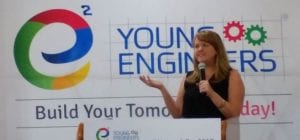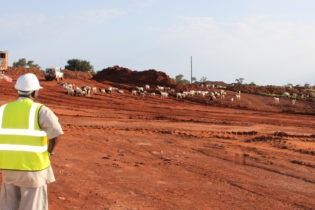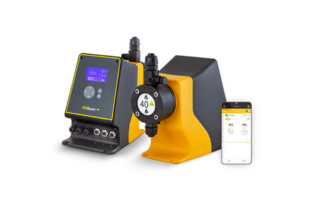
Jessi Sunkel, Young Engineers South Africa. Photo: Twitter
By Jessi Sunkel,
Young Engineers South Africa
There have been plenty of books and movies and papers predicting the future and how it will look and how humans will engage with one another and the world around them. The most famous of all these is the film Back to the Future – many mourn the modern failure to create self-tying shoelaces or flying skateboards.
What people don’t realise is that these inventions and their capabilities emerge from the minds of the engineers and the scientists. Those who can see the potential in a simple item and who visualise a world where people can fly and traffic doesn’t exist.
Unfortunately, there’s a chasm between this giddy ideology and the reality of today. It’s a chasm created by a lack of education, limited interest in the fields of science and engineering, and dwindling support for those who want to dream in code and calculation. There has to be a fundamental shift in how education approaches the fields of Science, Technology, Engineering and Maths (STEM) so it ignites young minds to forge new paths and think in ingenious ways.
A focus on future generations of engineers
In a recent blog post, Professor Mark Gudzial from the Georgia Institute of Technology, wrote that ‘engineering education ought to own the E in STEM education policy. Engineering skills and practices can be tailored to different audiences and embedded in STEM education.” His point is critical – the focus needs to be on the future generations of engineers and scientists and to achieve this, education has to be capable of reaching a diverse audience.
It needs to embrace those who look different, think differently and have different believes, and it needs to show students what is possible with the skills they are learning. Teach children using evidence, engage them with hands-on activities and projects, and show them how these learnings are relevant to their futures.
There is an urgent need to establish an original and unparalleled educational approach that’s designed to assist the engineers of tomorrow. To develop platforms and classrooms that provide them with engaging educational spaces and to encourage them to enter into these spaces from a very young age.
The young mind is utterly open to ideas and hasn’t been shaped by culture or tradition and this is the most important time to allow children to fully explore their ingenuity. To allow them to adapt tools in their own ways to find their own solutions to set challenges.
Engineering an interest in STEM
Want to engineer an interest in STEM? Create an original approach to education that allows for young minds to explore complex problems and find solutions.
Create a space where they can explore ideas, try out new concepts and appreciate the benefits of failure. In South Africa there remains a stigma attached to failure. A business fails, an idea falls apart or a project doesn’t work – these are seen as hugely negative and often people label those who fail as being unsuccessful or incapable.
However, this is not a trend that can be found on international shores. In the USA, the annual FailCon conference has now gone global thanks to people recognising the value of failure. It is an entire conference dedicated to people’s mistakes.
Richard Branson, founder of Virgin and serial entrepreneur said: “It is only through failure we learn. Many of the world’s finest minds have learned this the hard way.” His sentiment is echoed by many of the world’s greatest success stories – Coco Chanel, Henry Ford, Dale Carnegie and Thomas A. Edison. In fact, the latter’s quote is one that every young STEM student should memorise – “I have not failed. I’ve just found 10,000 ways that won’t work.”
For South Africa to become a thriving, entrepreneurial driven, high-tech economy the education system needs to create highly skilled professionals. Today, that isn’t happening with the intensity or volume needed to effect real change so it lies on the shoulders of the corporate, the business and the government to invest in this future with innovative educational opportunities. Tomorrow is just around the corner and we need to ensure we are ready today.







